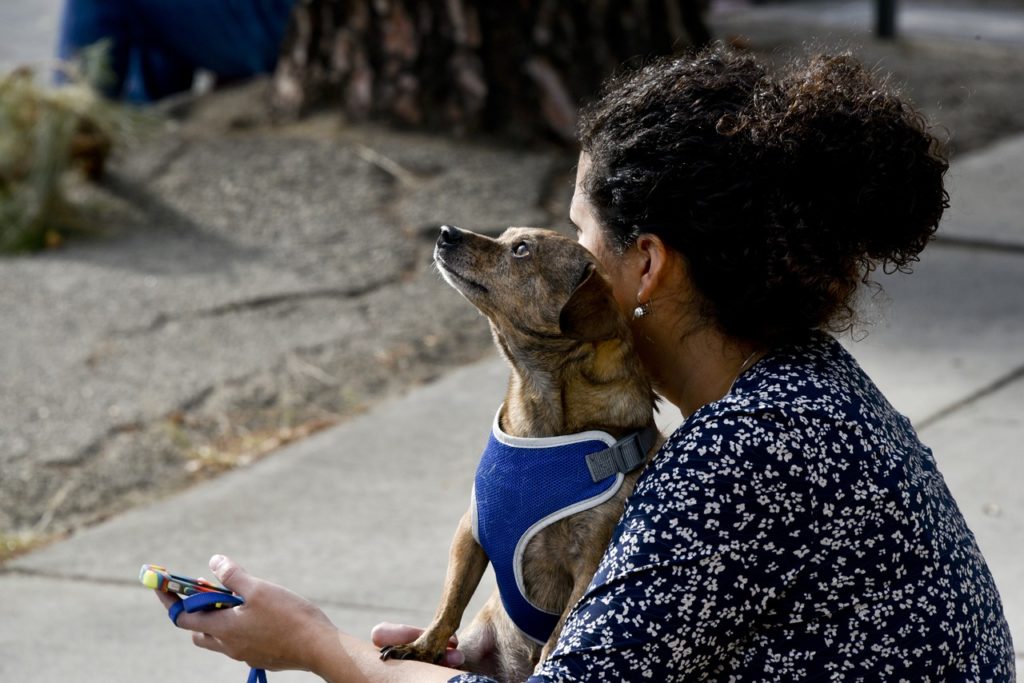- Calls to this hotline are currently being directed to Within Health, Fay or Eating Disorder Solutions
- Representatives are standing by 24/7 to help answer your questions
- All calls are confidential and HIPAA compliant
- There is no obligation or cost to call
- Eating Disorder Hope does not receive any commissions or fees dependent upon which provider you select
- Additional treatment providers are located on our directory or samhsa.gov
Pet Therapy for Eating Disorder Recovery While in College

Contributor: Crystal Karges, MS, RDN, IBCLC, Director of Content and Social Media at Eating Disorder Hope/Addiction Hope
There is no questioning how difficult and challenging the road to recovery can be for those who have struggled with an eating disorder. Because of the complexities of these mental health illnesses, the recovery process often involves many different aspects and steps that help a person heal physically, mentally, emotionally, and psychologically.
By nature, eating disorders are isolating illnesses, often creating a wedge between the sufferer and their loved ones. Eating disorders also cause a sufferer to become disconnected from their own body, especially when repetitively engaging in behaviors that ignore the body’s most basic cues, like need for nourishment.
Helpful Forms of Therapy for Recovery
Eating disorder recovery should be comprehensive and highly individualized to meet the needs of the sufferer. There are several different forms of therapy that can be helpful in the recovery process from an eating disorder, and it is important to work with a specialized treatment team to determine what is most appropriate for addressing the needs and concerns that are present.
If you are a college student in recovery from an eating disorder, having some ongoing support through therapy can be helpful in maintaining your recovery efforts. If you are especially drawn to animals or have had a special connection with animals in your past, you may consider integrating animal or pet therapy as part of your ongoing treatment.
While this can be challenging while living on a college campus, animal therapy can occur off-campus, and some campuses may allow service pets under special circumstances.
Benefits of Animal Therapy
According to the American Humane Association, A nimal-Assisted Therapy can be a therapeutic and effective treatment for those dealing with mental illnesses, such as eating disorders. The most common animals used for animal assisted therapy include dogs and horses, and therapy animals can include therapeutic visitation, animal assisted therapy, and facility therapy.
nimal-Assisted Therapy can be a therapeutic and effective treatment for those dealing with mental illnesses, such as eating disorders. The most common animals used for animal assisted therapy include dogs and horses, and therapy animals can include therapeutic visitation, animal assisted therapy, and facility therapy.
If you are interested in learning more about animal therapy, consider exploring this option with your treatment team prior to transition to college.
Your therapist or counselor may be able to help connect you with a facility or trained specialist who is able to integrate animal therapy as part of your ongoing recovery from an eating disorder. Also be sure to discuss with your college counselors to determine any rules or regulations that may be in place when in comes to service animals.
Community Discussion – Share your thoughts here!
How has pet therapy been a helpful part of your recovery?
 About the Author: Crystal is a Masters-level Registered Dietitian Nutritionist (RDN) with a specialty focus in eating disorders, maternal/child health and wellness, and intuitive eating. Combining clinical experience with a love of social media and writing, Crystal serves as the Special Projects Coordinator for Eating Disorder Hope/Addiction Hope, where her passion to help others find recovery and healing is integrated into each part of her work.
About the Author: Crystal is a Masters-level Registered Dietitian Nutritionist (RDN) with a specialty focus in eating disorders, maternal/child health and wellness, and intuitive eating. Combining clinical experience with a love of social media and writing, Crystal serves as the Special Projects Coordinator for Eating Disorder Hope/Addiction Hope, where her passion to help others find recovery and healing is integrated into each part of her work.
As a Certified Intuitive Eating Counselor, Crystal has dedicated her career to helping others establish a healthy relationship with food and body through her work with EDH/AH and nutrition private practice.
The opinions and views of our guest contributors are shared to provide a broad perspective of eating disorders. These are not necessarily the views of Eating Disorder Hope, but an effort to offer discussion of various issues by different concerned individuals.
We at Eating Disorder Hope understand that eating disorders result from a combination of environmental and genetic factors. If you or a loved one are suffering from an eating disorder, please know that there is hope for you, and seek immediate professional help.
Last Updated & Reviewed By: Jacquelyn Ekern, MS, LPC on August 19, 2016
Published on EatingDisorderHope.com

The EatingDisorderHope.com editorial team comprises experienced writers, editors, and medical reviewers specializing in eating disorders, treatment, and mental and behavioral health.

